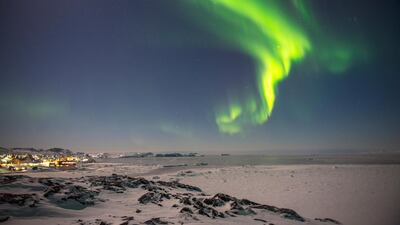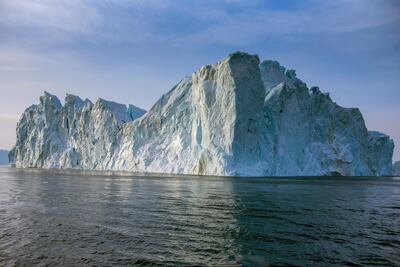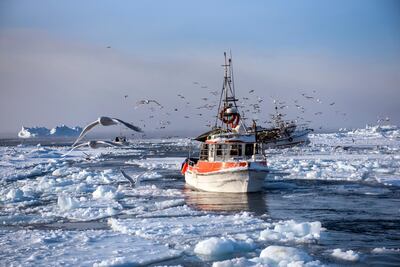With a pack of sled dogs charging out in front, Karl Jerimiassen, the hood of his blue anorak pulled tightly over his head, is running up behind me. Once the sled picks up speed and we're gliding over the snow-covered bedrock, he turns up the tempo and, in one swift motion, lets go of the handlebar and leaps on to the sled, in front of me. He sits, legs dangling to the side, and calls in Greenlandic to his qimmit, Inuit for dogs. His voice is encouraging, a soothing, indulgent baritone. The dogs are young ("still puppies", he says) at 18 months old and training to pull and race. In the winter, when the waters freeze ice-blue in Ilulissat, Greenland's third-largest city, 350 kilometres above the Arctic Circle on the west coast, fishermen such as Jerimiassen take tourists on sled rides to supplement their income.
Reflected in his sunglasses, a landscape of white dazzles. I hold on tight to the sides, my compulsory outer suit of seal fur – the garb worn by Inuit in these parts for centuries – insulating my body, which is already covered in four ski-shop-approved layers, against the -23°C temperatures that drop the further out we ride.

The bone-cold wintry day ahead
To prepare for the day’s activities – snowshoeing, hiking, travelling to the fjords in Disko Bay by boat – or even just to walk to town for lunch, I exert Herculean-style willpower getting dressed, knowing the cold will punish a single square of exposed skin. I’m in Greenland in the height of a bone-cold winter to connect with the customs of the Inuit people, who have made this unforgiving land, covered in 80 per cent ice, their home. Many agree that “Greenland” is a misnomer – a crafty bit of marketing to attract potential settlers by the Viking Erik the Red, who arrived here from Iceland in 982AD.
The wind chill gives my face the prickly sensation of a skin peel mixed with the rising numbness of dental anaesthesia. I look over at Jerimiassen's flushed weather-beaten cheeks; he doesn't flinch. "Getting warm today," he smiles. The mushers train their dogs all year – the breed arrived with the Thule people, who migrated out of Asia via the Bering Straits, leaving Siberia 1,000 years ago. Greenlandic dogs are believed to be relatives of the extinct Taimyr wolf, unlike their modern canine counterparts, who are related to the grey wolf. Here, they are kept chained outdoors (too many have mauled locals in the past) and under government supervision. Dogs that travel below the Arctic Circle aren't allowed to return, and the hounds here are kept as "pure" as possible.

'Think of them as wolves'
“Oh, they aren’t like the huskies,” Mads Klausen, a tour guide tells me when I arrive, thinking I’d be trained to operate the sled myself, like I have in Finland with a pack of Siberian and Alaskan huskies. “Think of them as wolves, and only do as the musher says,” he adds.
Lucky for me, Jerimiassen is generous with petting and cuddling his dogs, and this puts me at ease. Soon, I'm doling out chin rubs and cooing to them too. Loyal, dominant and hard-working, the Greenlandic hounds thrive with a purpose. Jerimiassen's older dogs take tourists on multi-day tours, but for the Inuit, transport by dog and sled has long been one of the few ways to navigate the unmapped icy terrain of what is the world's largest island.
Other modes include snowmobile, boats in summer and helicopters in emergencies. Only four towns have roads, including Ilulissat and the capital city, Nuuk. Then there's the kayak (a Greenlandic word), which arrived with the first wave of immigrants 4,000 years ago, and is still used for transport and hunting. Flights around Greenland tend to be expensive, and such as internet connectivity, are wholly dependent on weather conditions – something I learn first-hand when stranded in Reykjavik for three nights waiting for the weather to clear in Nuuk.
Mushing for a slowly rising tourism market
For the fishermen in this harbour town known for its halibut and cod, the harsh winters that drop down to -30°C mean that, apart from recreational ice-fishing, mushing for a tourism market that's slowly on the rise, catching a spillover from neighbouring Iceland, has become a crucial means of survival.
Ilulissat-born Knud Rasmussen, the part-Inuit explorer and anthropologist who was the first European to cross the unpredictable sea ice of the Northwest Passage by dog sled in the 1920s, was known for his indefatigable spirit in brutally taxing conditions. His most famous contribution, though, may be his work documenting the customs and folklore of what he called “the people of the Polar North”.
Accompanying hunters (most Greenlanders fish and hunt for sustenance, skills tied to their cultural heritage), the dogs pull sleds and pulks, and if victorious, they haul back seal, walrus, reindeer, musk ox or polar bear in remote regions where it is sometimes the only food source for months. The government has condoned the latter under very strict laws.
The ship will 'return in a month'
There is no choice but to adopt a flexible attitude in Greenland – I realise this early on. While based in Ilulissat, surrounded by the aquamarine icebergs of Disko Bay and the sounds of dogs howling, and cracking and shifting, I learn that the supply ship can't dock. It leaves without offloading the town's fresh produce and provisions. "It will return in a month," Klausen tells us on a city walk as we tour the harbour, with its fish processing plants and the trawlers lying suspended on frozen water.
Incidentally, the traditional Greenlandic diet is based on fish, seal and whale products – protein and fat. The vegetable aisles at the local supermarkets are running low now. Up here, nothing grows in winter. Only in the south, lettuce, potatoes, other root vegetables, herbs and berries are grown in the summer or in greenhouses, and inland there a few sheep farms. Greenland’s 56,182 inhabitants depend on imports all year around for fresh produce – milk and chicken, for example, must be flown or shipped in.
While summer excursions to Greenland bring the promise of warmer temperatures, hiking among wildflowers, whale and polar bear sightings, the midnight Sun and voyages to the calving glaciers in Eqi, winter brings an ethereal landscape against ghost-white skies, with soft pink sunrises on clear mornings. It's also the best time to catch the Northern Lights – the only good excuse to leave your cosy bed at 1am.
Back in Nuuk, over dinner at Cafe Inuk, Liisi Egede Hegelund, co-owner of the cafe and Inuk Hostel, on the edge of the city, says: "Maybe you can't imagine it now, but in the summer we have barbecue by the rocks at the water. We cook for our guests and eat and share stories like the old people did."
___________
Read more:
Could this be the world's most remote hotel?
Top 100 city destinations: Dubai among world's most visited
On the move: What's in a tourism tagline?
___________
Sustainable practices are intrinsic to Greenlandic life
Together with Maren-Louise P Kristensen, the women represent two generations of Inuit who are invested in cultural tourism, a few beats slower than the adventure punted further north. We share a winter meal of air-dried fish, seal blubber, smoked salmon, reindeer stew and glacier water with Angelica-infused ice, while the duo explain their culinary heritage and customs, and how sustainable practices are intrinsic to Greenlandic life. Kristensen says: "Take the fish, the seal – every part is used. There is no wanton hunting, no profit to be made for the sake of it. Nothing is wasted, it all serves a purpose."
Having studied abroad, Kristensen felt a pull to return to her homeland. "I want to be part of this change, to steer tourism the right way. Greenlanders value peace. We are kind, hospitable people," she says.
"That we don't have roads everywhere, may be our saving grace," Hegelund says when they speak of a western culture steeped in instant gratification. They tell me that patience and resourcefulness are innate to the Inuit.
Here in Greenland, where some days you might feel like you’re at end of the world, these are traits that become vital.



